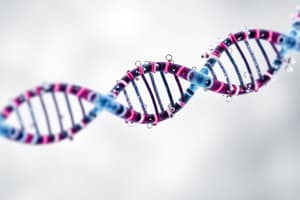Podcast
Questions and Answers
What is the key equipment commonly used in PCR?
What is the key equipment commonly used in PCR?
- Microscope
- Incubator
- Centrifuge
- Thermal cycler (correct)
What is the essential ingredient for PCR that is highly active at around 70 degrees Celsius?
What is the essential ingredient for PCR that is highly active at around 70 degrees Celsius?
- DNA helicase
- Heat-stable DNA polymerase (correct)
- RNA polymerase
- DNA ligase
How many primers are typically used in each PCR reaction?
How many primers are typically used in each PCR reaction?
- One
- Two (correct)
- Four
- Three
What is the function of the DNA template in PCR?
What is the function of the DNA template in PCR?
What are nucleotides used for in PCR?
What are nucleotides used for in PCR?
What is the purpose of the polymerase chain reaction (PCR)?
What is the purpose of the polymerase chain reaction (PCR)?
What does the term 'polymerase' refer to in PCR?
What does the term 'polymerase' refer to in PCR?
What does 'chain reaction' mean in the context of PCR?
What does 'chain reaction' mean in the context of PCR?
How does the number of DNA copies progress in PCR?
How does the number of DNA copies progress in PCR?
What can be achieved in just a few hundred reactions using PCR?
What can be achieved in just a few hundred reactions using PCR?
Flashcards
PCR Equipment
PCR Equipment
The key piece of equipment used in polymerase chain reaction is a thermal cycler.
DNA Polymerase
DNA Polymerase
A heat-stable enzyme essential for copying DNA in PCR.
PCR Primers
PCR Primers
Two short DNA sequences that target and bind to specific DNA regions.
DNA Template
DNA Template
Signup and view all the flashcards
PCR Nucleotides
PCR Nucleotides
Signup and view all the flashcards
PCR Purpose
PCR Purpose
Signup and view all the flashcards
PCR Polymerase Function
PCR Polymerase Function
Signup and view all the flashcards
PCR Chain Reaction
PCR Chain Reaction
Signup and view all the flashcards
PCR amplification speed
PCR amplification speed
Signup and view all the flashcards
PCR outcome
PCR outcome
Signup and view all the flashcards
Study Notes
Key Equipment for PCR
- Thermocycler: A device that cycles temperatures to facilitate denaturation, annealing, and extension during PCR.
- Microcentrifuge: Used for mixing and spinning down samples in PCR tubes.
- PCR tubes or plates: Specialized containers designed to withstand thermal cycling.
Essential Ingredient for PCR
- Taq polymerase: A thermostable enzyme that operates effectively around 70 degrees Celsius, vital for synthesizing new DNA strands.
Primers in PCR
- Typically two primers are used in each PCR reaction, one for each strand of the DNA template, enabling targeted amplification.
Function of the DNA Template
- Provides the original sequence that is amplified, serving as a blueprint for the synthesis of new DNA strands during PCR.
Use of Nucleotides in PCR
- Nucleotides serve as the building blocks for new DNA strands that are synthesized during the PCR process.
Purpose of Polymerase Chain Reaction (PCR)
- PCR aims to amplify a specific DNA segment, producing millions of copies from a minimal initial amount of DNA.
Definition of 'Polymerase'
- Polymerase refers to the enzyme responsible for synthesizing DNA by adding nucleotides to the growing DNA strand complementary to the template.
Meaning of 'Chain Reaction' in PCR
- 'Chain reaction' describes the exponential increase in DNA copies generated through repeated cycles of denaturation, annealing, and extension.
Progression of DNA Copies
- The number of DNA copies doubles with each cycle of PCR, leading to an exponential increase, theoretically producing over a billion copies in just 30 cycles.
Achievements through PCR
- PCR can facilitate the generation of millions to billions of DNA copies in just a few hundred reactions, enabling extensive genetic analysis and research.
Studying That Suits You
Use AI to generate personalized quizzes and flashcards to suit your learning preferences.




